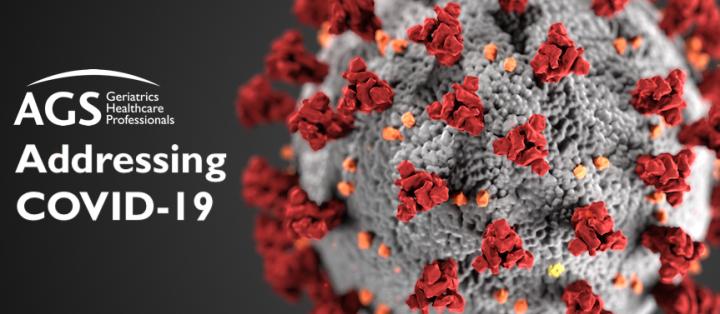
Credit: (C) 2020, American Geriatrics Society
In a policy brief published today in its namesake journal (DOI: 10.1111/jgs.16510), the American Geriatrics Society (AGS) offered a roadmap to guide federal, state, and local governments addressing COVID-19 concerns in an important but oft-overlooked arena: Assisted living facilities (ALFs). The brief, which joins an earlier statement on COVID-19 care in nursing homes (DOI: 10.1111/jgs.16477), outlines recommendations based on the latest research and guidance, encompassing actions on resource needs, patient transfers, priorities for public health, and opportunities to better empower health workers on the frontlines of COVID-19 care.
“As we’ve already learned, outbreaks impacting older people are a foreseeable consequence of this pandemic, even with experts working as valiantly as they are,” notes AGS President-Elect Annie Medina-Walpole, MD, AGSF. “We hope this brief can help policymakers, advocates, and clinicians look at but also beyond the circumstances we can control–and those we can’t–to prioritize the innovation, collaboration, and compassion that can put key patients and public health first. That’s a cardinal direction for planning in crisis and in calm, regardless of where we may live as we age.”
Nationwide, more than 800,000 people live in more than 28,000 ALFs, which employ more than 450,000 individuals. More than 80 percent of all ALFs residents are 75 years old or older. However, these individuals also live with increased susceptibility to the serious complications of COVID-19, including respiratory failure and death. Given the wide variety of structure and staffing for ALFs, most are not as well-resourced compared to other settings to respond to COVID-19. Though some elements of nursing home guidance could by adopted by ALFs, many still may struggle to implement best practices while more targeted recommendations are unavailable.
In reviewing existing research and recommendations, the AGS suggested orienting expertise towards several focal points where tangible action can make a difference:
- The AGS called for President Trump to exercises his full authority under the Defense Production Act so the U.S. can move quickly to increase production and distribution of important supplies. These include personal protective equipment (PPE) and COVID-19 tests and related laboratory equipment, but also supplies for symptom management and end-of-life care.
- The AGS reinforced the importance of robust COVID-19 testing and contact tracing to prevent the further spread of the disease, not only among ALF residents but also staff. Experts’ estimates of the U.S. need for testing have a wide range, from 750,000 tests per week to more than 22 million tests per day. Contact tracing–the aggressive and resource-intense process of tracking who infected individuals may have seen or encountered while contagious–also will be vital as we start to loosen restrictions.
- The AGS reinforced the importance of carefully considering transfers between ALFs, hospitals/emergency departments, and other care settings. AGS experts noted, for example, that the first and best option for individuals who test positive for COVID-19 remains to stay at home and quarantined unless symptoms are so serious that care only is available in a hospital. For ALFs, decisions to transfer a symptomatic or COVID-19-positive resident should consider the person’s goals of care and be guided by a clinician who can work with the individual’s primary care provider to manage care in place, if possible. Residents who test positive for COVID-19 and are discharged from other settings (like hospitals or skilled nursing facilities) should not return to an ALF unless the facility can safely isolate the patient from other residents and has adequate infection control protocols and PPE for staff and community members.
- AGS experts also emphasized that state, county, and local health departments must do all they can to advance infection control. This includes engaging with ALFs to limit the spread of COVID-19. This also includes providing technical assistance for screening, obtaining testing for residents and staff, providing guidance on advanced hygiene practices, and communicating about and supporting physical distancing, among a variety of important priorities.
- The AGS also reinforced the importance of supporting health professionals, our nation’s frontline defense for treating and preventing the spread of COVID-19. The AGS encouraged Congress to advance paid family, medical, and sick leave for the whole health workforce, for example, while also enhancing COVID-19 screening and training to protect staff availability. As we continue to learn and grow from this emergency, the AGS also urged Congress to provide educational and grant opportunities for direct care workers, who play a critical role in ALFs. In addition to their physical and emotional demands, jobs in aging services are complex, requiring training and experience caring for older adults. At present, these workforce needs go unrecognized in pay scales, reimbursement rates, and state regulations.
The AGS policy brief is available with free access from the Journal of the American Geriatrics Society, which also issued its own call for COVID-19 scholarship to undergo expedited review and publication. AGS updates, including work on clinical practice, public policy, and public and professional education, will be posted to the Society’s COVID-19 information hub at https:/
###
About the American Geriatrics Society
Founded in 1942, the American Geriatrics Society (AGS) is a nationwide, not-for-profit society of geriatrics healthcare professionals that has–for 75 years–worked to improve the health, independence, and quality of life of older people. Its nearly 6,000 members include geriatricians, geriatric nurses, social workers, family practitioners, physician assistants, pharmacists, and internists. The Society provides leadership to healthcare professionals, policymakers, and the public by implementing and advocating for programs in patient care, research, professional and public education, and public policy. For more information, visit AmericanGeriatrics.org.
Media Contact
Daniel Trucil
[email protected]
Original Source
https:/
Related Journal Article
http://dx.




